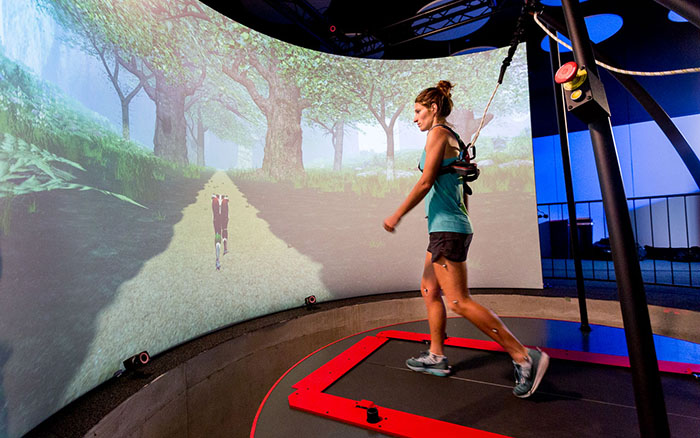Biomechanics and medical implants

We are at the forefront of personalised orthopaedics and maxillofacial implant development globally. Our designs include superior biomechanical fit, faster patient recovery, longer implant life and improved patient outcomes. Our successes include a world-first surgery using personalised technologies to replace the jaw joint.
We use advanced imaging, computational modelling and virtual prototyping systems to personalise an implant. For three-dimensional human motion evaluation, we employ the Computer Assisted Rehabilitation ENvironment (CAREN), a six-degrees-of-freedom motion platform and treadmill, surrounded by immersive virtual reality with high-speed motion capture cameras. Our technologies allow us to design and virtually prototype medical devices and implants unique to patients’ needs. Personalised devices also draw on innovations in biocompatible materials and advanced manufacturing.
Our focus
- Personalised orthopaedic devices for shoulder, hip, knee, spine, foot and ankle
- Cranio-maxillofacial implants and accompanying surgical instruments, including cutting and drilling guides
- Cadaveric biomechanical testing to assess implant efficacy
- Post-operative evaluation of implant functional performance
Capabilities
- Computational modelling and simulation for surgical planning and implant design, as well as virtual clinical trials
- Implant fabrication using rapid prototyping
- In vitro biomechanical testing using cadaveric models and testing instrumentation
- Human motion measurement, including video motion analysis and biplane X-ray fluoroscopy
Our partners
- 3DMeditech
- Anatomics
- Austin Health
- Beijing Naton Medical Group
- Blatchford
- Defence, Science and Technology
- DePuy Synthes
- Epworth HealthCare
- Materialise
- Objective 3D
- OMX Solutions
Royal Melbourne Hospital, Melbourne Health - Syneos Health
- The Royal Children's Hospital Melbourne
Case studies
New joint design unlocks improvements for jaw repairs
Researchers at the University of Melbourne’s School of Engineering, together with maxillofacial surgeon Dr George Dimitroulis, have developed the world’s first customisable design for a prosthetic jaw joint.
Porosity to improve craniofacial surgical implants
A technique to make polymer-based skull implants more bone-like in their structure has been developed to improve outcomes for patients relying on implants to repair cranial injuries.
Polymer implants provide next-generation medical treatments
The potential of miniature implants to deliver controlled doses of medicine over many months is expected to revolutionise health care and improve treatment for an increasingly wide range of conditions over the next decade.
Centre to train new generation of specialists designing personalised implant technologies
The Centre for Medical Implant Technologies brings together PhD and early career researchers with industry and government to support translation of research into new products, processes and solutions.
Media releases
Personalised medical implants to improve the health of Australians
Australians researchers are developing the technology to produce 3D printed replacement joints and bones designed and built specifically for patients.